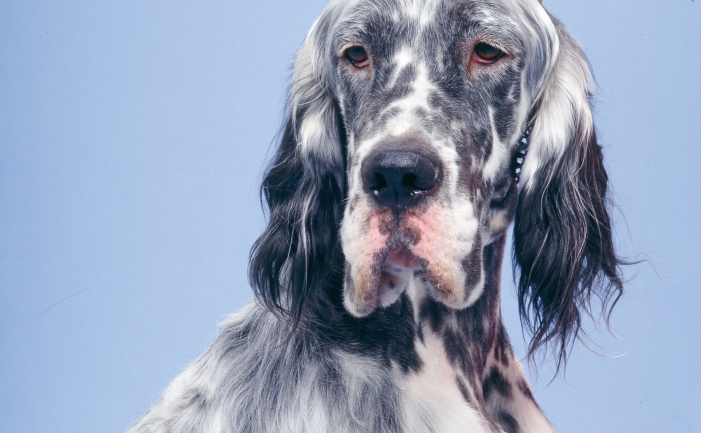Breed: English Setter
Temperament: gentle, people-oriented
Lifespan: 10-12 years
Maintenance: low-medium
Recommended for: active families
Appearance: This is a medium-sized dog with a silky, mid-length coat. Colours are spotted or ticked (called ‘belton’) and include orange belton, blue, and tri-colour on a white background. They stand between 61-68cm (24-27″).
Temperament: The English Setter is said to be a fun-loving breed but rather more laid-back than its exuberant cousin the Irish Setter, yet more animated than the sober Gordon Setter.
They can be mischievous as pups and should be watched around very small children as they may unintentionally bowl them over.
Health:
As with all setters, bloat can occur and it is best to feed smaller meals twice daily to avoid the potentially fatal problem. They should not be exercised immediately before or after a meal; Fair skin could be more susceptible to skin disorders and allergies; Blindness due to retinal degeneration is known. Check with breeders regarding the health history of the parents.
Breeding & cost: Litters average six to eight pups with few whelping problems. Pups are usually white for the first few weeks before the colour comes through. Pups cost from $500.
Housepet potential: English Setters need to be part of the family and breeders say, while they are good inside houses, they’re unsuitable for apartments. A well-fenced backyard is essential.
Space & exercise: These dogs were bred for decades as working dogs and need regular exercise. One owner takes her English Setter on a 5km run each day! If neglected or bored they can resort to barking and digging.
Ideal owner: These are good dogs for active families with older children but could be too much of a handful for the elderly or the very young. A well-fenced backyard is essential.
Grooming: A thorough brushing once a week should keep the coat free of tangles and twigs. It’s important to trim the hair between the toes and keep the soft hair behind the ears free of knots.
Uses: While developed as a gundog to accompany hunters, in modern Australia the English Setter is primarily a companion animal. They are not considered a guard breed.
Trainability: In his “Intelligence of Dogs”, Stanley Coren rates the English Setters as being of above-average trainability. Basic obedience skills are recommended.
Popularity: While never achieving the fashionability of its cousin, the Irish (Red) Setter, the English has a faithful following but is less well known in Australia than the UK and Europe. Fewer have been bred in Australia in recent years.
History: Setters were developed to assist the hunter to find game then crouch, or set, before it, and some still retain this instinct. Claimed to have been used for 400 years in England, it may have been developed from the Spanish pointer or other old working spaniel breeds. A working, or ‘field’ strain is still known in the UK.
National contacts
To find up-to-date contacts for breeders, contact the following organisations.
The Australian National Kennel Council (ANKC)
www.ankc.org.au
Dogs NSW
http://www.dogsnsw.org.au/breeders-directory
Email: [email protected]
Phone: 1300 728 022 (NSW only) or (02) 9834 3022
Fax: (02) 9834 3872
Dogs Victoria
http://www.vca.org.au
Email: [email protected]
Phone: (03) 9788 2500
Fax: (03) 9788 2599
Dogs ACT
http://www.actca.asn.au
Email: [email protected]
Phone: (02) 6241 4404 – Fax: (02) 6241 1129.
Dogs West
http://www.cawa.asn.au
Email: [email protected]
Phone: (08) 9455 1188
Fax: (08) 9455 1190
Dogs SA
http://dogssa.com.au
Phone: (08) 8349 4797
Canine Control Council of Queensland
http://www.cccq.org.au
Email: [email protected]
Phone: (07) 3252 2661
Fax: (07) 3252 3864
Tasmanian Canine Association
http://www.tasdogs.com
Email: [email protected]
Phone: (03) 6272 9443
Fax: (03) 6273 0844
Dogs NT
http://www.territorydogworld.com
Email: [email protected]
Phone: (08) 8984 3570
Fax: (08) 8984 3409
The Australian National Kennel Council (ANKC)
www.ankc.org.au
Dogs NSW
http://www.dogsnsw.org.au/breeders-directory
Email: [email protected]
Phone: 1300 728 022 (NSW only) or (02) 9834 3022
Fax: (02) 9834 3872
Dogs Victoria
http://www.vca.org.au
Email: [email protected]
Phone: (03) 9788 2500
Fax: (03) 9788 2599
Dogs ACT
http://www.actca.asn.au
Email: [email protected]
Phone: (02) 6241 4404 – Fax: (02) 6241 1129.
Dogs West
http://www.cawa.asn.au
Email: [email protected]
Phone: (08) 9455 1188
Fax: (08) 9455 1190
Dogs SA
http://dogssa.com.au
Phone: (08) 8349 4797
Canine Control Council of Queensland
http://www.cccq.org.au
Email: [email protected]
Phone: (07) 3252 2661
Fax: (07) 3252 3864
Tasmanian Canine Association
http://www.tasdogs.com
Email: [email protected]
Phone: (03) 6272 9443
Fax: (03) 6273 0844
Dogs NT
http://www.territorydogworld.com
Email: [email protected]
Phone: (08) 8984 3570
Fax: (08) 8984 3409



